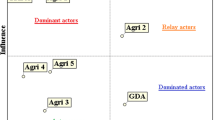Abstract
This paper presents a procedure for decision analysis in water use conflicts among irrigators. It seeks feasible compromise term among decision makers by using optimal results for different proposals of solutions. The process is developed by applying the Graph Model for Conflict Resolution. The case study is the existing conflict among Coqueiros canal water users. This 45 km canal belongs to a complex irrigation and drainage canal network and it is located at Campos dos Goytacazes municipality, in the northern region of the State of Rio de Janeiro. Its basin has a potential irrigable area of approximately 14,000 ha. Six hypothetical scenarios have been built, each one corresponding to different alternatives to the conflict solution. In addition, two different tendencies were adopted by the Management Institution (MI) in order to take care of the conflict. The first tendency takes into account that the MI has no explicit preferences for any of its actions. As for the second one, the MI shows explicit preferences for the scenarios which provide more income taxes. Some scenarios that reached the state of equilibrium were analyzed to provide solutions to the conflict.
Similar content being viewed by others
References
Barkhi R (2005) Information exchange and induced cooperation in group decision support systems. Sage, USA
Berge C (1973) Graphs and hypergraphs. North-Holland, Amsterdam
Bondy JA, Murty USR (1976) Graph theory with applications. North-Holland, New York
Brams SJ, Wittman D (1981) Nonmyopic equilibria in 2×2 games. Confl Manage Peace Sci 6:39–62
Carneiro PRF (2004) Água e conflito na Baixada dos Goytacazes. REGA 1(2):87–100
Fang L, Hipel KW, Kilgour M (1988) The Graph Model approach to environmental conflict resolution. J Environ Manag 27:195–212
Fang L, Hipel KW, Kilgour M (1993) Interactive decision making: the graph model for conflict resolution. 10th ed. NY, USA
Fraser NM, Hipel KW (1979) Solving complex conflicts. Transactions on systems, man and cybernetics. IEEE Trans Syst Man Cybern 9:805–817
Fraser NM, Hipel KW (1984) Conflict analysis: models and resolutions. North-Holland, New York
Furtado LLS, Campos JNB (1997) Manejo e Cobrança de Água no Sistema de Vazanteiros e Irrigantes do Sistema Orós – Lima Campos. Annals of the XII Brazilian Symposium of Water Resources, Vitória, Brazil
Getirana ACV (2005) Analysis of solutions to agricultural water use conflicts by applying linear programming techniques (in Portuguese). M.Sc. thesis, COPPE/UFRJ, Rio de Janeiro, RJ, Brazil
Getirana ACV, Santos CSM, Bomfim E, Azevedo JPS (2005) Metodologia para a determinação de usuários de recursos hídricos do setor agrícola através de SIG visando o planejamento de bacia hidrográfica. In: Annals of the XXXII Brazilian Symposium of Cartography, Rio de Janeiro, Brazil
Harary F (1969) Graph theory. Addison-Wesley, Reading, MA
Harary F, Norman RZ, Cartwrigth D (1965) Structural models: an introduction to the theory of directed graphs. Wiley, New York
Hipel KW, Kilgour DM, Fang L et al (1997) The decision support system GMCR in environmental conflict management. Appl Math Comput 83:117–152
Howard N (1971) Paradoxes of rationality. MIT, Cambridge, MA
Kilgour DM (1984) Equilibria for far-sighted players. Theory Decis 16:135–157
Kilgour DM (1985) Anticipation and stability in two-person noncooperative games. In: Ward MD, Luterbacher U (ed) Dynamic models of international conflict. Lynne Rienner, Boulder, CO, pp 26–51
Kilgour DM, Hipel KW, Fang L (1987) The graph model for conflicts. Automatica 23(1):41–55
Malta VF, Damázio JM, Magalhães PC (2005) Use of the graph model for conflict resolution in water resources. In: III International conference on water resources management. WIT, UK
Mbonile MJ (2005) Migration and intensification of water conflicts in the Pangani Basin, Tanzania. Habitat Int 29:41–67
Nash JF (1950) Equilibrium points in n-person games. Proc Natl Acad Sci U S A 36:48–49
Nash JF (1951) Noncooperative games. Ann Math 54(2):286–295
Ribeiro MMR, Dorfman R (1996) Application of game theory to reduce agricultural loss caused by water shortage (in Portuguese). RBRH 1(2):53–70
Rogers P (1968) A game theory approach to the problem of international river basins. Water Resour Res 5(4):749–760
Roubens M, Vincke PH (1985) Preference modelling. Springer, Berlin Heidelberg New York
Rufino ACS, Vieira ZMCL, Ribeiro MMR (2005) Análise de conflito na definição da vazão de fronteira em bacia interestadual. In: Annals of the XVI Brazilian Symposium of Water Resources, João Pessoa, Brazil
Sneddon C, Fox C (2006) Rethinking transboundary waters: a critical hydropolitics of the Mekong basin. Polit Geogr 25:181–202
Souza Filho FA, Porto RL (2005) Modelo de alocação comando e controle: MACC utilizando teoria dos jogos – uma proposta. In: Annals of the XVI Brazilian Symposium of Water Resources. João Pessoa, Brazil
Unesco (2002) Conflict and cooperation related to International Water Resources: historical perspectives. UN, Paris, France, p 208
United Nations (1988) Assessment of multiple objective water resources projects: approaching for developing countries. United Nations Environment Programme, p 125
Vieira ZMCL, Ribeiro MMR (2005) Conflict analysis: decision support in urban water demand management, (in Portuguese). RBRH 10(3):23–35
Von Neumann J (1928) Zur Theorie der Geselschaftspiele. Math Ann 100:295–320
Von Neumann J, Morgenstern O (1953) Theory of games and economic behavior. Princeton University Press, Princeton, NJ
Zagare FC (1984) Limited-move equilibria in 2×2 games. Theory Decis 16:1–19
Author information
Authors and Affiliations
Corresponding author
Rights and permissions
About this article
Cite this article
Getirana, A.C.V., Malta, V.d.F. & de Azevedo, J.P.S. Decision Process in a Water Use Conflict in Brazil. Water Resour Manage 22, 103–118 (2008). https://doi.org/10.1007/s11269-006-9146-8
Received:
Accepted:
Published:
Issue Date:
DOI: https://doi.org/10.1007/s11269-006-9146-8




